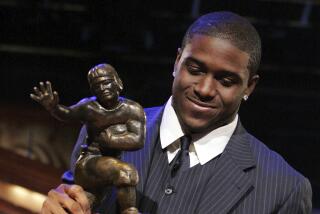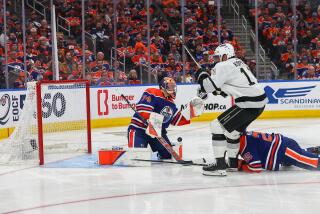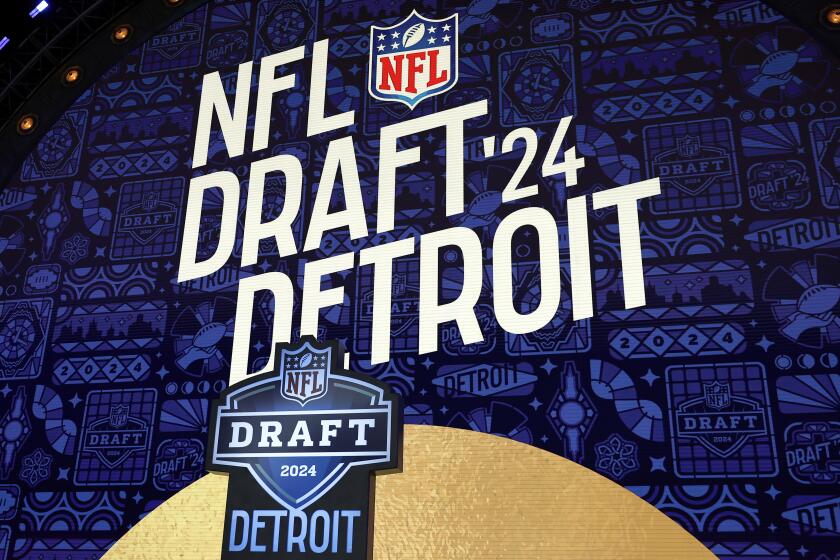Don’t Expect Any Juicy Tidbits
Bud Selig says he sent George Mitchell out to reconstruct the steroid era.
In the days since its unveiling, the mission has been described variously as noble, absurd and, by almost anyone who might be contacted by Mitchell’s investigators, a complete waste of time.
That, of course, will be entirely up to them. If those who lived it, saw it, benefited and suffered from it choose not to remember it, then what we’ll have is a report that reads a lot like leaked grand jury testimony and a few splashy books.
Calls to half a dozen player agents found none who would recommend his clients, past or present, roll over on teammates who fouled their bodies and the game with steroids.
There are plenty of players who will gripe privately of toiling in a decade warped by drugs not officially banned by baseball until 2002. Few, if any, will feel strongly enough to turn whistle-blower, Jose Canseco being among the exceptions, though this time there won’t be a buck in it.
“That’s up to the individual player,” agent Scott Boras said. “I think any major league player realizes that ... they’ve got a career, a future and a reputation inside the game. I don’t know what a player will have to gain by disclosing historical facts that have nothing to do with his career.”
Within the game, Boras said, “You’re there to protect confidences that are given to you by teammates. The written rule among players is what’s said to him in confidence remains in confidence.”
Jeff Borris, Barry Bonds’ agent, would not speak specifically about Bonds’ strategy when the call comes, though it’s fair to assume he won’t risk a perjury charge to cleanse his soul.
But, if Mitchell has a notion of angling to the players through the agents, there probably won’t be much there, either.
“If I were called, I would assert the attorney-client privilege,” said Borris, who is a lawyer. “And that’s no indication of whether I was hiding or not hiding anything.”
One agent believed retired players would be most likely to divulge secrets, perhaps at the peril of an awkward moment at the alumni golf tournament, and a few said the players’ union should provide protection.
No one seems to know where Mitchell will show up first, though the BALCO tree seems a fair place to start shaking.
That a copy of a personal letter sent March 16 from an Idaho judge to Selig, describing a chance meeting between the judge and Bonds’ trainer, Greg Anderson, would arrive two weeks later at the San Francisco Chronicle is suspicious. In some baseball circles, this is viewed as investigators hoping to smoke out Bonds through Gary Sheffield. Sheffield, in town with the Yankees, would not comment.
Major League Baseball executives said they passed the letter along to Mitchell, and don’t know how a copy was made public. Presumably, it came from MLB, Mitchell or the judge, Chief U.S. Magistrate Larry M. Boyle.
“We had nothing to do with it,” a baseball source said.
The issues that grip baseball -- no matter what they are -- tend to emanate from the Yankee clubhouse or roll downhill into the Yankee clubhouse. While much of this load -- too much, probably -- is Bonds’ to carry, Sheffield and Jason Giambi have a piece too. The thing about Joe Torre’s clubhouse is, there’s something bubbling just below the surface in front of every locker. It’s the nature of the franchise and the city it represents, even if this is potentially more combustible than most.
“We seem to be the high-profile team,” Torre said. “But I really don’t [believe it will be harmful to our season]. The reason is, more than anything else, worrying about it is not going to eliminate it. Here, just about on a daily basis, there’s something to deal with.
“You don’t pretend it’s not there. You deal with it and set it aside once the game starts.”
It is a grand objective for the entire sport. But, of course, it’s too late for that. As Bonds marches on Babe Ruth and Henry Aaron, as Sheffield’s relationship with Anderson is alleged to run deeper, and as Mitchell and his team pick at the edges of truth and hearsay, steroids will run in baseball’s wake.
*
Sympathies to Jim Dixon and his family for the terrible loss of Maggie, the Army women’s basketball coach. For years, and with great pleasure, Jim has narrated the lives of his three children from the saddle of a Studio City gym’s stationary bike. It’s a very sad day.... Congratulations to the Tigers and Brewers. Only 1,400 more innings to play, give or take.... Must-watch TV: Wednesday night’s Mets at Nationals, Pedro Martinez pitching, Jose Guillen batting third. Guillen has been hit by Martinez pitches five times in his career, twice Thursday night at Shea Stadium. Guillen, to the Washington Post: “You know what? If I get hit again, it’s going to get real ugly if he’s pitching. Sooner or later he’s going to get hurt. I can guarantee you that.” ... Many scouts wouldn’t be surprised if, in the first season of Selig’s three-strikes-and-you’re-out steroid policy, there was a spike in home runs. There is a noticeable loss in velocity out there, particularly among relievers. One AL scout: “The thing that’s most misunderstood is that steroids were 50-50 between pitchers and hitters. The general public thinks it’s the power hitters. For me, it’s the middle, setup and closer relievers. There are a lot of fastballs that are a foot shorter.”
More to Read
Get our high school sports newsletter
Prep Rally is devoted to the SoCal high school sports experience, bringing you scores, stories and a behind-the-scenes look at what makes prep sports so popular.
You may occasionally receive promotional content from the Los Angeles Times.






